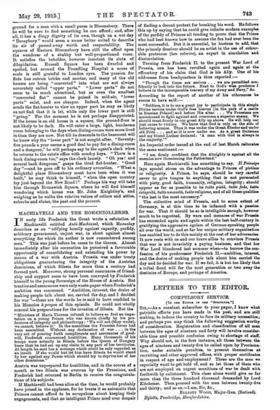MACHIAVELLI AND THE HOHENZOLLERN&
IN early life Frederick the Great wrote a refutation of Machiavelli entitled Anti-dfachiavel, which Macaulay describes as an "edifying homily against rapacity, perfidy, arbitrary government, unjust war, in short against almost everything for which its author is now remembered among men." This was just before he came to the throne. Almost immediately after his coronation he perceived a favourable opportunity of consolidating and extending his power by means of a war with Austria. Prussia man under treaty obligations guaranteeing the integrity of the Austrian dominions, of which Silesia for more than a century had formed part. Moreover, strong personal assurances of friend- ship and support seem to have been conveyed by Frederick himself to the young Sovereign of the House of Austria. But treaties and assurances were only waste-paper where Frederick's ambition was concerned. "Ambition, interest, the desire of making people talk about me, carried the day, and I decided for war "—these are the words he is said to have confided to his Memoirs apropos of this episode. He could not wholly conceal hie preparations for the invasion of Silesia. But the "Ministers of Maria Theresa refused to believe so foul an impu- tation on a young Prince who was known chiefly by his pro- felsions of integrity and philanthropy 'We will not (they wrote), we cannot, believe it.' In the meantime the Prussian forces bad been assembled. Without any declaration of war . . . in this very act of pouring forth compliments and assurances of good- will, Frederick commenced hostilities. Many thousands of his troops wore actually in Silesia before the Queen of Hungary knew that he bad set up any claim to any part of her territories. At length be sent her a message which could be only regarded as an insult. If she would but let him have Silesia he would stand by her against any Power which should try to deprive her of her other dominions."
Austria was unprepared for hostilities, and in the course of a month or two Silesia was overrun by the Prussians, and Frederick had returned to Berlin to receive the congratula- tions of his subjects.
If Machiavelli had been alive at the time, he would probably have joined in the applause, for he treats it as axiomatic that Princes cannot afford to be scrupulous about keeping their engagements, and that no intelligent Prince need ever despair of finding a decent pretext for breaking his word. He follows this up by saying that he could give infinite modern examples of the perfidy of Princes all tending to prove that the Prince who had best known how to assume the fox had ever been the most successful. But it is essential, he hastens to add, that the princely deceiver should be an artist in the use of colour- able pretences Pen colorire), an expert in simulation and dissimulation.
Turning from Frederick IL to the present War Lord of Prussia, one has been revolted again and again at the effrontery of his claim that God is his Ally. One of his addressee from headquarters is thus reported :—
" Though the times ar. serious ... we are permitted con- fidently to look into the future. Next to God's wise prudence I believe in the incomparable bravery of my Army and Navy," Ac. According to the report of another of his utterances he seems to have said :- ° Soldiers, it is to me a great joy to participate in this simple Divine service under God's free heaven [in the park of a mile in Russian Poland] and before His altar.. . . We Prussians are accustomed to fight against and overooms a superior enemy. We should trust firmly in our great Ally up above. He will help our just cause to victory. We know that God is only on the side of believing armies. Thus it was under the Great Elector and under old Fritz . . and so it is now under me. As a great Sootamaa and my friend Luther declared: 'A man with God is always is the majority:"
An Imperial order issued at the end of last Marsh reiterates the same sentiment
" I am firmly confident that the Almighty is against all the enemies now threatening the Fatherland."
Here again Machiavelli han something to say. Il Principe lays special stress on the advantage to Princes of pietism or religiosity. A Prince, he says, should be very careful never to give tongue to anything that is not permeated with piety, good faith, humanity, religion, integrity; should appear as far as possible to be hitt° pieta, tulle fede, hate integrity, tutto amanita, tulle religion., and of all these qualities "the last is the most necessary."
The collective mind of Prussia, and to some extent of Germany, is at this time to be inflamed with • passion for war. That it should be so is intelligible enough, however much to be regretted. By wars and menaces of war Prussia has succeeded again and again within the last half-century in gratifying the aggressive egoism of German-speaking people all over the world, and so far her unique military organization has enabled her to do this mainly at the cost of her adversaries. It now rests with us and our brave allies to convince Prussia that war is not invariably a paying business, and that her War Lord blundered last summer when—to borrow the con- fession of his predecessor Frederick II.—ambition, interest, and the desire of making people talk about him carried the day and be decided for war. If we fail, it is but too likely that a tribal fiend will for the next generation or two sway the destinies of Europe, and perhaps of America.


































 Previous page
Previous page